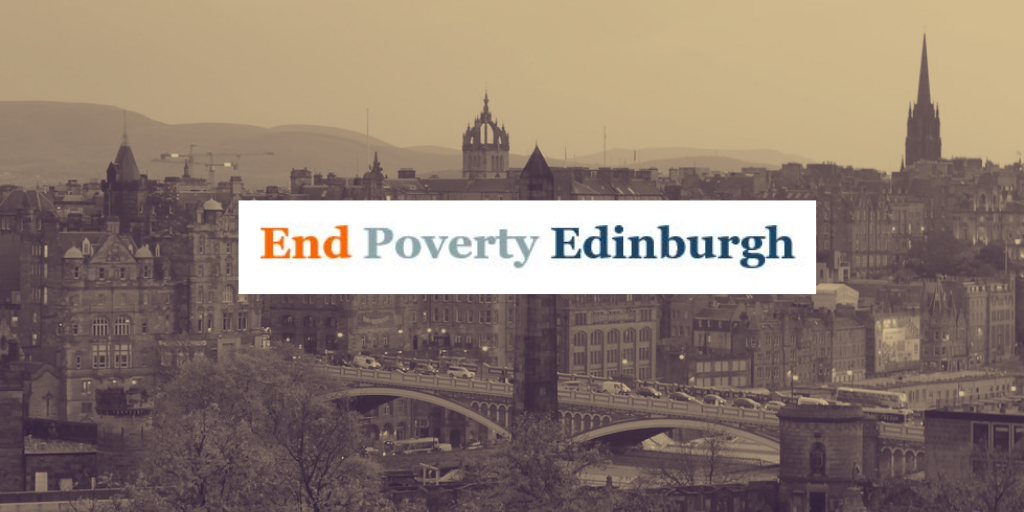“We need to break the chain” – Linda Craik, End Poverty Edinburgh Member.
This quote has stuck with me since first hearing it a couple of months ago when working with End Poverty Edinburgh (EPE). EPE are a group of citizens who have either lived experience of poverty in the city or care about it greatly. I have been blown away by their knowledge, passion and determination to end poverty in Edinburgh. The group have a variety of experiences, and subsequently, a variety of expertise. As one member put it, ‘everybody brings something to the table’.
EPE show how people with lived experience can come together and work alongside agencies and organisations, co-producing services to be approachable, and accessible. Set up in 2020, they aim to raise awareness of poverty in Edinburgh and influence decision making, regarding all aspects affecting poverty – they aim to break the chain.
The notion of this chain has stuck with me as it implies a linkage between various subjects, in my interpretation, by a heavy, rusty, ageing chain. Certainly, the group has made clear that so many things are connected when it comes to poverty – if we can change one aspect for the better, it might also greatly improve another. We see this in the group’s main priorities, highlighting housing, fair work, food insecurity and stigma as central links in the chain.
For EPE, addressing housing issues are key. In their words, Edinburgh is ‘overflowing’ with private houses, which are often rented out at unaffordable costs. During our discussions, the group proposed that even mid-market rent is still priced way too high for most people. Subsequently, EPE have challenged phrases such as ‘affordable housing’, insisting they are not affordable to those who need them.
By fair work, EPE speaks about more than simply wages. Of course, a fair wage is an essential part of fair work. Our discussions have leaned strongly in favour of employers paying a real living wage, one that ensures workers are living, rather than surviving. To truly live, however, perhaps requires more.
As EPE have shown me, fair work also means contractual sick pay and maternity pay, an effective voice in the workplace, and of course, guaranteed working hours. Indeed, being on £9.90 an hour is essential, but without the hours to back it up, how can someone guarantee they’ll pay the bills and buy food for their family. Certainly, there are times people cannot, unveiling a link to another of EPE’s identified priorities, food insecurity.
It is no secret that food insecurity is a problem experienced across the whole of the UK. The COVID-19 pandemic exacerbated the situation, doubling the amount of people supported by Universal Credit from 3 million in March 2020 to over 6 million in March 2021, alongside a record 1.9 million food parcels distributed in 2019/20. But as EPE is keen to remind, this has been the situation for some time, and somehow foodbanks have become an accepted part of society. In their recent response to Edinburgh Poverty Commission’s Progress Report 2021, EPE state ‘we should not be relying on these services to feed people. This is a sign of a society that is not doing enough to tackle poverty’.
That is not to belittle the outstanding work that food banks and emergency food providers do to meet immediate need and help people in desperate circumstances. However, as EPE state, ‘these services stigmatise those accessing them – EPE want to eliminate this kind of charity approach to address food poverty’. Here lies yet another link in the chain, with stigma being another priority area for EPE.
EPE believe the stigma and shame related further impacts those who find themselves in the grip of poverty. It can put people off reaching out for help. Dignity is stripped away as people find their options limited and themselves judged and labelled by strangers. EPE strive to change this, and I wholeheartedly stand in arms with our member Carmen Simon when she said ’tackling food poverty shouldn’t be done through charity but through a social justice and equality approach. In one of the richest countries in the world, we should be able to have food with dignity’.
Fortunately, there are places those experiencing such indignities can reconnect with those ethical imperatives, and I believe EPE is one of those places. As EPE member Heather Pugh said, ‘End Poverty Edinburgh is a safe space, you can tell how poverty has impacted us, you can be upfront and honest’.
To create these safe spaces we must use a co-productive approach, working on an equal basis to recognise the skills and assets that everyone brings from their own experiences. Crucially, we must achieve positive change. Because it is exactly this honesty and openness that we believe holds the potential to influence the future of poverty in our city. As these experts by experience share their knowledge, inform decision making, work with others, and strive to end poverty in Edinburgh. Let’s break these chains, one link at a time.
– Steven Drew, Community Participation Officer, The Poverty Alliance


Enter your email address to receive regular e-updates about our work. If at any time you want to stop receiving these, simply contact us. We’ll keep your details safe and won’t share them with any other organisations for their marketing purposes. For full details see our Privacy Policy.